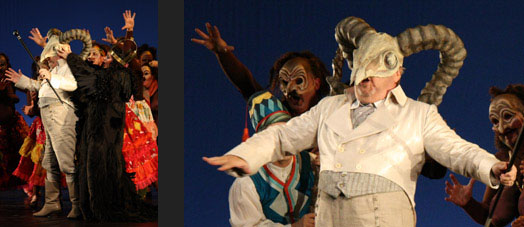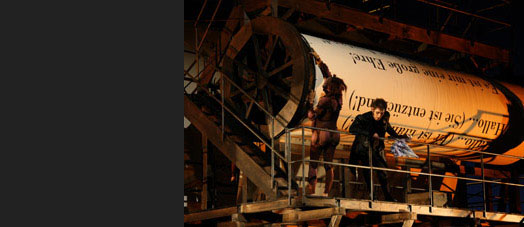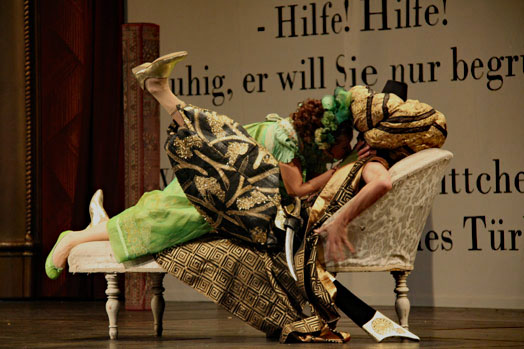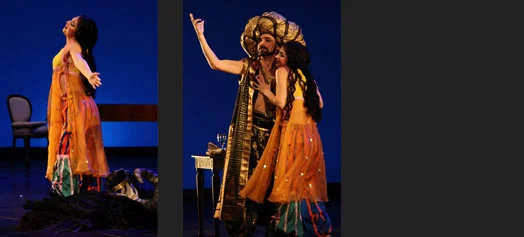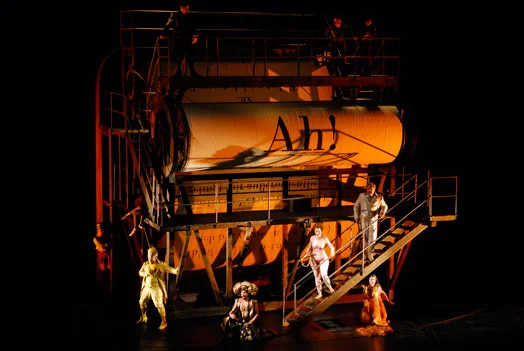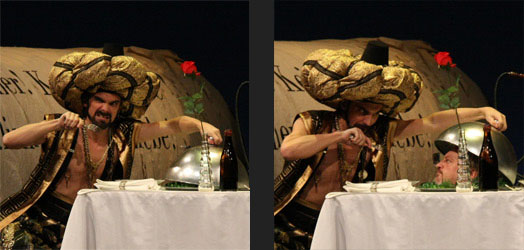IL TURCO IN ITALIA
DRAMMA BUFFO PER MUSICA IN TWO ACTS BY GIOACCHINO ROSSINI
FIRST ACT
SECOND ACT
PHOTOS © Karijn Dillmann / Andreas Birkigt 2009
PRODUCTION
Oper Leipzig
intendant: Alexander von Maravić
première: 7 november 2009
conductor: Andreas Schüller
stage director / set design: Michiel Dijkema
costumes: Claudia Damm
dramaturgy: Katrin Böhnisch / Christian Geltinger
light design: Michael Röger
Fiorilla: Viktorija Kaminskaite
Geronio: Paolo Rumetz
Narciso: Timothy Fallon
Selim: Giovanni Furlanetto
Zaida: Claudia Huckle / Lena Belkina
Albazar: Dan Karlström
Prosdocimo: Giulio Mastrototaro
pantomimes: Meylem González, Sylvia Metz, Sabine Schaft, Ines Vieweger
stage musicians: Bo Price (Hammerklavier), Sebastian Schneider (clarinet), Edgar Hesse (clarinet), Abel Pérez Armas (horn), Tobias Schmidt / Gunter Bauer (oboe)
chorus of the Oper Leipzig (chorus director: Stefan Bilz) / extras of the Oper Leipzig
orchestra: Gewandhausorchester Leipzig
PRESS QUOTES
“sensational libretto-machine”
That’s still possible: You come from the opera, and instead of feeling depressed, you are feeling inspired. [...] Michiel Dijkema und Claudia Damm were flooded with overwhelming jubilation: their Rossini is fantastic and the sensational libretto-machine obviously a gift to mankind. Il Turco in Italia is an opera persiflage, which is pulled off with bravura: intelligent, very funny – with touching moments.
Bild
9 November 2009
“incredibly comical”
Amusing theatre with double meaning
The audience rewarded the première of Gioacchino Rossini’s Il Turco in Italia with long lasting applause for all participants and numerous bravos. [...] Here, in the middle of sparkling comedy, intelligent wit and anarchic jokes, grand emotions are being debated. And yet – or for that very reason – the Turco at the Oper Leipzig is great fun. [...] Dijkema burns down a true firework of gags, which technical precision is impressive. For example how in the first act again and again new protagonists fall down from the drawing floor. Or how Dijkema’s enormous libretto-machine, heart and eye-catcher of this production, brings the fabulously freshly translated texts to the audience. Throughout the evening it’s driven and completed by wizened theatre creatures, who – when nothing else seems to work any more – send first-class solo wind players on stage, to inspire the poet and give the singers new arguments. That’s amusing theatre with double meaning. And the skinhead and the Turkish cleaner, who interrupt the play from time to time, assisted from the audience by outraged actors – who accidentally become part of the libretto – self ironically poke fun at modern ways of staging opera, in such a way, that everybody is laughing tears. […] An incredibly comical production, which without any doubt will be a box office hit. The jubilation after the premiere made this very clear.
Peter Korfmacher
Leipziger Volkszeitung
9 November 2009
“delightfully light and ingenious”
The machine is dictating
What Michiel Dijkema achieves with those characters, creating an delightfully light and ingenious self-parody, can’t be described, because it doesn’t make the wit, which is part of every movement, of every subtle repartee, of every sung or acted joke, any better than it already is. [...] Everything has the staged precision of a clockwork and the lightness of champagne bubbles.
Irene Constantin
Tageszeitung Neues Deutschland
19 November 2009
“brilliant coup de théâtre”
The subtitle machine!
Dijkema’s trick is: The characters evolve from themselves, literally fall down from the sky with a loud bang, develop their own stories, and leave the author with the role of the „recycling text writer“, while caricaturing gender- and cultural clichés with playful delicacy. To focus this critical parody on the mechanism of „subtitles“ is a brilliant coup de théâtre! [...] An ingenious idea, technically implemented with excellence – a set design of communicative intensity, unforgettable! [...] In any case: The opera in Leipzig is offering a hit production!
Franz R. Stuke
Opernnetz
10 November 2009
“sparkling witty ideas”
This staging puts the audience completely in the process of creating a libretto, which is realized on stage at that very moment, and thus also in the line of thought of the poet. [...] The production is intelligently made, full of variation, appropriate to this opera and interlarded with sparkling witty ideas.
Dr. Andreas Gerth
Operapoint
November 2009
“skilfully [...] direct and absurd”
Man and machine
Skilfully the layers of the story-telling fit together. [...] Selim, the exotic looking for a wife, never enters without his carpet and an oversized water pipe. And when the deceived husband needs to dress up similarly and enters with a very small water pipe, the laughs have long left the textbook level. The more direct and absurd the humour, the better this evening is functioning beyond all subject-constituent psychologization.
Anke Charton
Leipzig Almanach
11 November 2009
“with ease well over three hours funny”
Parody of a parody
Very funny: Rossini’s Turk in Italy at the opera in Leipzig
Michiel Dijkema ventures a scenic parody of this parody, and builds a large, antique looking libretto-machine à la 1814 (six meters high, seven wide) in the centre of the otherwise empty revolving stage. With the greatest of ease he is well over three hours funny. [...] The poor poet is surrounded by small lively idea-dwarfs. During the overture they are suggesting subject matters, which end in death, or are already existent. The new ideas, in form of giant wonder-bags, crash on the stage from the sky. One by one the main characters appear from those bags.
Joachim Lange
Freie Presse
11 November 2009
“Go see it!”
Pure jubilation for a scandal
Go see it! [...] The audience received the première with pure jubilation. [...] Wife and husband, old and new lover, a dumped mistress and her factotum, in addition a masked ball, role reversal, duplications, and being in the thick of it an overstrained librettist: The staging lovingly enhances this complex situation with the possibilities of the commedia dell’arte, with a casual translation, with excellent stage music and countless – also pyrotechnical – pleasantries. Extravagant costumes and funny props plump down in bags. The gipsy chorus appears as a gaggle of naked dwarfs in cranky suits, the luxury Turk never enters without his Persian carpet. At the same time stage director and ensemble take comedy very seriously and work with great precision, without which even the best gag wouldn’t function. And in the end – with a wink – they show the limits of the genre: When Fiorilla sobbingly lies on the floor, the opera drops its trousers, pardon, its coulisse. The libretto-machine goes crazy, musicians and singers fall out of their roles. Here, the break off of the performance is an act of mercy. [...] You will leave the opera house after three hours runtime in the certainty to have experienced a coherent, highly entertaining, self-ironic evening.
Ute van der Sanden
Mitteldeutsche Zeitung
8 November 2009
“a grand idea”
Just once the world gets disrupted: Fiorilla lies on the floor, her husband Geronio had kicked her out of the house, and her despair seems real. The action is stagnating. In view of her vulnerability Fiorilla is denying the opera a happy-end. Geronio interrupts: What’s wrong with that woman, why is not singing? Is she sick? Turbulence on the stage. The technical staff stands dumbfounded. Curtain, applause – and only then the knot is cut, as Prosdocimo, the poet, Rossini, tradition and genre are demanding... This is a grand idea from the twilight zone between theatre and life, with which Michiel Dijkema is ending this opera on the creation and absurdities of an opera libretto.
Peter Korfmacher
Leipziger Volkszeitung
9 November 2009
“a weight of five and a half tons”
This room-high wooden construction, with a weight of five and a half tons, is optically a crossing of printing press and hand loom, and is rotating on the revolving stage of the opera in Leipzig. Since the beginning of this year the theatre workshops have been building this libretto-machine of the stage director, have been painting every single character by hand on a canvas with a total length of 1770 feet. Six extras are rotating the text role, which production is the main theme of this comical opera “The Turk in Italy” by Gioacchino Rossini.
Ute van der Sanden
Mitteldeutsche Zeitung
8 November 2009
FROM A TOSCA REVIEW (2011)
“the now legendary libretto-machine”
Dijkema ist an der Oper Leipzig kein Unbekannter: Vor zwei Jahren landete er hier mit seiner Inszenierung von Rossinis Il Turco in Italia einen beachtlichen Erfolg: Um die mittlerweile legendäre Libretto-Maschine entwarf Dijkema ein an verschiedene historische Theaterformen angelehntes turbulentes Spiel mit mehreren Ebenen und bewussten Brüchen zwischen Fiktion und »Realität«, die er zu einem ebenso gewitzten wie intelligenten Ganzen zusammenfügte.
Der Neue Merker
Ingo Rekatzsky
17 October 2011












